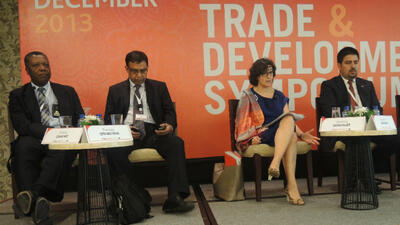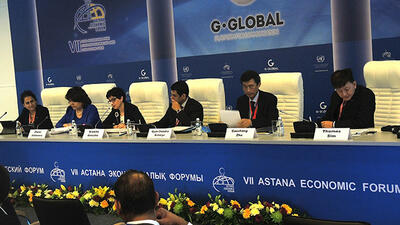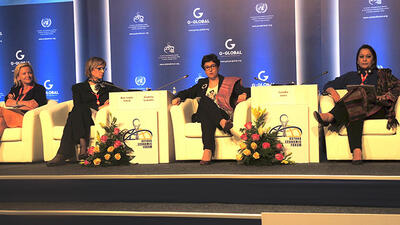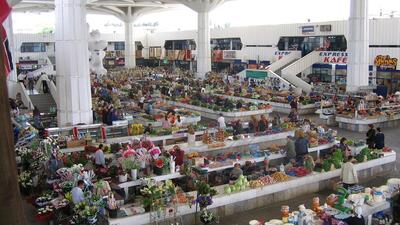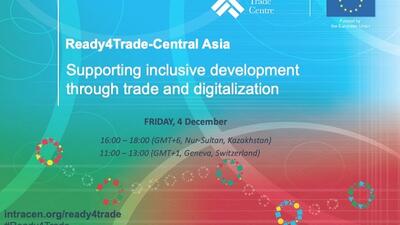


Central Asia reaches milestones in connecting small businesses to European markets, facilitating international trade
Policymakers, private sector partners and business representatives from five Central Asia countries meet in Kazakhstan to advance extra and intraregional trade.
During three regional events, the International Trade Centre (ITC) demonstrated the results of its European Union-funded Ready4Trade Central Asia project, highlighting the continuous efforts for intraregional and international trade in five Central Asia countries. They focused on:
- The efforts in transparent cross-border trade and removing regulatory and procedural barriers.
- The development of a Cross-Border Management Curriculum to strengthen business’ compliance with cross-border formalities.
- The results and success factors of the gender-responsive trade facilitation initiative and the way forward to ensure sustainable progress.
-
The first regional event allowed Central Asia policymakers and business representatives to discuss opportunities offered by the launch of the Info Trade Central Asia Gateway
The Central Asia Gateway aggregates the information from each national Trade Facilitation Portal in Kazakhstan, Kyrgyzstan, Tajikistan, Turkmenistan, and Uzbekistan and gives operators easy access to product-specific information on cross-border trade formalities.
The platform leverages the power of all national portals across Central Asia to help connect the region to international markets. Developed with ITC’s and the UN Conference on Trade and Development’s technical support, trade facilitation portals were implemented in 30 countries around the world, contributing to achieving the goal of trade facilitation embedded in Article 1.2 of the WTO Trade Facilitation Agreement.
In Kazakhstan, the Portal already reduced the time and cost of doing trade across borders. Since its launch on 4 July 2022, the platform (developed by QazTrade Center for Trade Policy Development JSC under the Ministry of Trade and Integration) has so far serviced more than 5,000 users with its audience rapidly expanding.
-
The second regional event allowed ITC partners to connect and reflect on the Cross-Border Management Curriculum in the region.
To promote regional and international trade, ITC designed and delivered free courses for small and medium-sized enterprises (SMEs) in each country. Over 4,500 SME representatives benefited from both online and in-person learning, covering procedural and regulatory cross-border requirements. These courses form a complete and up-to-date Cross-Border Trade Management Curriculum and are designed for future exporters and company executives to improve their skills. Courses range from international trade rules to export procedures, transit routes, quality and compliance standards, as well as specific requirements of the European Union market.
-
The third regional event allowed Women Business and Customs Broker Associations as well as government and other private sector representatives to take stock of the achievements of Gender Responsive Trade Facilitation initiative, to pave the way for the future.
To understand the constraints that women face when conducting cross-border trade and provide tangible solutions, ITC conducted a survey with more than 1,500 women across five countries in Central Asia. More than 600 border officials were trained on how to develop fair, ethical trade facilitation practices for creating a gender responsive border environment, while more than 350 women entrepreneurs improved their understanding of customs legislation and international regulatory frameworks, specifics of negotiations with customs brokers, as well as rules, rights and obligations while crossing the border.
Youri Sakskevitch, Programme Officer at the Delegation of the European Union to the Republic of Kazakhstan, said leading up to the events: “The launch of the Info Trade Central Asia Gateway is an important milestone for the whole Central Asian region. It is also in line with the EU’s plan to support smart investments in quality infrastructure. The second initiative – the Cross-Border Management Curriculum – is key to unlocking the potential of the Central Asian private sector and moving towards export diversification.”
“Transparency in cross-border trade and private-sector capacity are both crucial for international trade,” explained Pierre Bonthonneau, Senior Trade Facilitation Advisor at the International Trade Centre. “The Central Asia Gateway and Regional Export Management Curriculum of the Ready4Trade Central Asia project and its partners provide a handy response to the needs of the private sector, in particular of small businesses.”
Nurlan Kulbatyrov, Deputy Director at the JSC “Center for Trade Policy Development” QazTrade said: “The QazTrade Academy is a unique platform that allows aspiring and experienced entrepreneurs and exporters to better understand the rules of international trade and their practical application to develop their businesses and enter new markets. In turn, Kazakhstan's Trade Portal serves as an informational reference tool, where anyone can easily find step-by-step information on export, import and transit procedures for priority commodities for Kazakhstani business.”
Kholbibi Eshonboboyeva, a young start-up owner commented on the project’s gender component, saying: “I am more confident in my abilities to trade internationally. I learned relevant rules and regulations, know my rights and how to act in unexpected situations at the border. The practical advice I received at the training was especially useful.”
Ready4Trade Central Asia is a four-year EU-funded project implemented by the International Trade Centre in close collaboration with national partners, designed to contribute to the overall sustainable and inclusive economic development of Central Asia by boosting intra-regional and international trade in the countries of the region. Beneficiaries of the Ready4Trade Central Asia project include governments, small and medium-sized enterprises, in particular women-led enterprises, and business support organizations.






